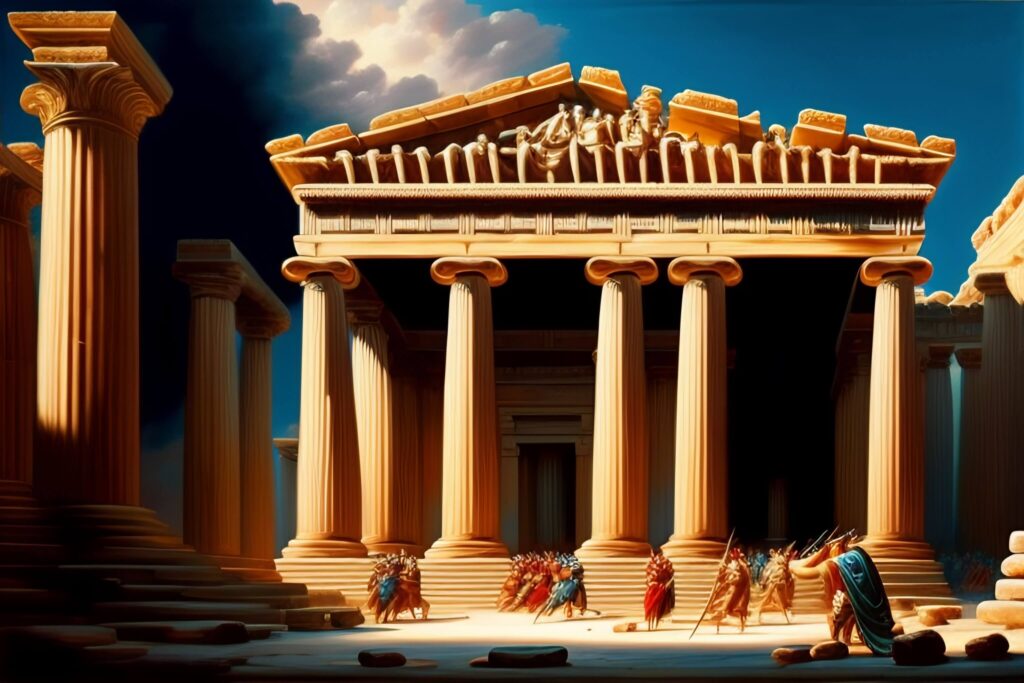Introduction:
Empedocles, a prominent figure in ancient Greek philosophy, left an indelible mark on the trajectory of Western thought. In this comprehensive exploration of Empedocles’ life, philosophy, and contributions, we aim to shed light on his distinctive ideas and their enduring relevance in today’s world.
The Greeks were unparalleled in their propensity for asking and answering profound questions. Their unique culture fostered an environment where neither authoritarianism, which stifles inquiry with harsh rebukes like “Shut up, what do you know…,” nor pragmatism, which dismisses questions as useless, could take root. Those who sought wisdom embraced the pursuit of questions, even those that might appear seemingly unimportant. This cultural climate allowed Parmenides’ perplexing inquiry, “What is there?” to endure.
Furthermore, the philosophers who dared to ask and answer these questions paved the way for the development of Greek natural philosophy, the precursor to modern Western science. Empedocles was a significant contributor to this intellectual tradition.
Who Was Empedocles?
Born in Agrigento, Sicily, in the 5th century BCE, Empedocles was a polymath—a philosopher, statesman, and poet. Deeply influenced by both Pythagoreanism and Parmenides’ philosophy, Empedocles synthesized diverse interests, ranging from natural science to metaphysics, to craft a holistic worldview that has captivated scholars for centuries.
Empedocles’ most significant contribution was his effort to rescue the concept of “nature” from Parmenides’ logic, which seemingly reduced the natural world to “nothingness.” He achieved this through his adept use of questions. By methodically answering questions and, in turn, posing new ones, Empedocles unraveled the mysteries of the natural world and its ever-changing dynamics.
His journey began with a question identical to Parmenides’—”What does it have?” However, Empedocles’ response diverged significantly from that of his predecessor. While Parmenides relied on the authority of a goddess to proclaim the nature of reality, Empedocles grounded his observations in the tangible world. He noted the abundance of natural objects surrounding us, all of which are born and eventually vanish. Yet, there were enduring elements that persisted amidst creation and dissolution.
For Empedocles, these enduring elements were earth, water, fire, and air. Did not trees, animals, and humans all originate from these four foundational materials and ultimately return to them? He posited that these four elements served as the basic building blocks, while everything else emerged and disappeared as a result of their combinations and separations.
Empedocles’ inquisitiveness did not stop there. He ventured further, asking, “If all things in nature share the same elemental composition, what accounts for the diversity we observe?” To answer this, he drew inspiration from Pythagoras’ numerical principles.
Empedocles proposed, “Although the materials that constitute everything are the same, their distinctive characteristics arise from variations in their modes of combination.” For instance, the elements comprising flesh and bone are identical, but when arranged in a ratio of 2:2:2, they form flesh, whereas a ratio of 2:0:4:2 yields bone. This conception laid the foundation for Proto-Chemistry—a framework explaining higher complexity through the amalgamation of fundamental elements.
However, Empedocles’ inquiry did not end here. He posed a third question: “If all natural phenomena stem from the amalgamation and dissolution of the four elements, what impels the forces of combination and separation?” The answer lay in the cosmic forces of “love” and “hate.” Love unites, while hate separates. Although remnants of a mythical worldview persisted, Empedocles recast them as attractive and repulsive cosmic forces—akin to the modern concepts of attraction and repulsion.
Yet, Empedocles’ originality transcended these concepts. He pondered further: “If the four elements are randomly combined and dispersed by the blind forces of love and hatred, should there not exist fantastical forms that we do not observe?” Should we not encounter beings with a cow’s body and a human’s head, or vice versa? However, these fantastical entities were conspicuously absent from our world.
Empedocles reevaluated this conundrum and proposed an answer: creatures with characteristics adapted to their environment survived, while those ill-suited to their surroundings perished. This idea—that random changes occur over time, but only those conducive to survival persist—forms the core of Darwin’s theory of natural selection. Empedocles, therefore, merits the title of the “father of evolution.”
Empedocles’ philosophical journey illuminates the power of inquiry—of asking and answering questions—to unravel the mysteries of the world. In the 21st century, we have a new avenue for questioning and answering: conversing with artificial intelligence. Here, the questioner remains human, and the quality of the answers depends on the precision and depth of the queries posed.

Empedocles’ Philosophy:
- Theory of the Four Elements: Empedocles postulated that all matter comprises four primary elements: earth, water, air, and fire. He argued that these elements interacted through forces of attraction and repulsion, shaping the physical world.
- Love and Strife: Empedocles introduced the concepts of Love (Philia) and Strife (Neikos) as fundamental cosmic forces. Love brought harmony and unity, while Strife drove disintegration and separation. These eternal forces governed the universe’s cyclical nature.
- Reincarnation and Transmigration: Empedocles proposed the notion of soul transmigration, wherein souls journeyed through various life forms, experiencing different earthly lives until attaining purity and divinity.
Empedocles’ Impact:
Empedocles’ philosophical tenets left an indelible mark on subsequent thought:
- Influence on Plato and Aristotle: Empedocles’ ideas, including the four elements and the cosmic forces of Love and Strife, profoundly influenced Plato and Aristotle. These concepts found their way into their respective works, shaping their understanding of the cosmos.
- Precursor to Modern Science: Empedocles’ emphasis on elemental interactions and the cyclical nature of the universe foreshadowed later developments in science, particularly in the fields of chemistry and physics.
- Influence on Romantic Poetry: Empedocles’ philosophical musings, his fascination with nature, and the interplay of cosmic forces influenced Romantic poets like William Wordsworth and Samuel Taylor Coleridge, who incorporated similar themes into their poetry.
Empedocles’ legacy endures as a testament to the power of inquiry and the enduring relevance of his philosophical contributions in shaping the course of Western thought.






